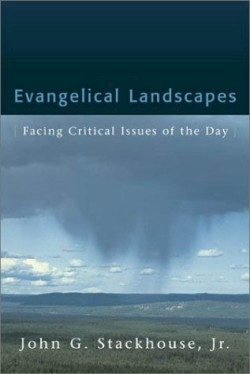
Evangelical Landscapes
Facing Critical Issues of the Day
“North American evangelicalism is the community-of
communities in which I have made my own religious way,“ explains the author. “I present these essays, therefore, with the love of a family memberÃ’critical, yes, but fundamentally loyal to this tradition that has tried, and often succeeded, to portray the image of Christ.”
Stackhouse, a faculty member at Regent College in British Columbia, Canada, presents eleven essays, taking a hard look at several core issues facing the evangelical world today. Any essay in the entire book would provoke angry and accusatory discussion with inflammatory defensiveness in a group of evangelicals meeting together to discuss subjects of this nature. The intense feelings and subsequent actions taken over each of the chosen essay topics have historically brought division and permanent disruption to various communities in the evangelical world. It is no wonder, then, that Stackhouse feels the need to affirm his loyalty to evangelicalism.
The author clearly states that his objective is to “inform and persuade,” which he does. He informs his readers of the situation and then persuades them to move to another viewpoint, another perspective on the subject, all the while maintaining the uniqueness of evangelicalism as the correct pathway to God. His writing in this book could be called a “State of the Union” address on evangelicalism.
After an insightful and difficult analysis of the stage of maturity in which the current evangelical world is stuck, (“Perpetual Adolescence: The Current Culture of North American Evangelicalism”), Stackhouse proceeds through a mine field of subjects such as parachurch organizations, the role of the leadership and the membership in the local church, the relevance of the Biblical text, finances and theology, as well as women in ministry and several other pertinent topics.
Each essay covers the subject first from a historical perspective, showing how the current condition came to exist and be the norm; then discusses the serious negative consequences that have resulted. Stackhouse’s historical information is accurate, his analysis pointed, and his criticisms well-placed. For anyone who has been intimately involved with evangelicalism for extended periods of time, this book is a tremendous resource and is coming to the market none to soon. Those who would like to see positive change begin to happen in evangelicalism will find it indispensable.
Reviewed by
Linda Wilson
Disclosure: This article is not an endorsement, but a review. The publisher of this book provided free copies of the book to have their book reviewed by a professional reviewer. No fee was paid by the publisher for this review. Foreword Reviews only recommends books that we love. Foreword Magazine, Inc. is disclosing this in accordance with the Federal Trade Commission’s 16 CFR, Part 255.
